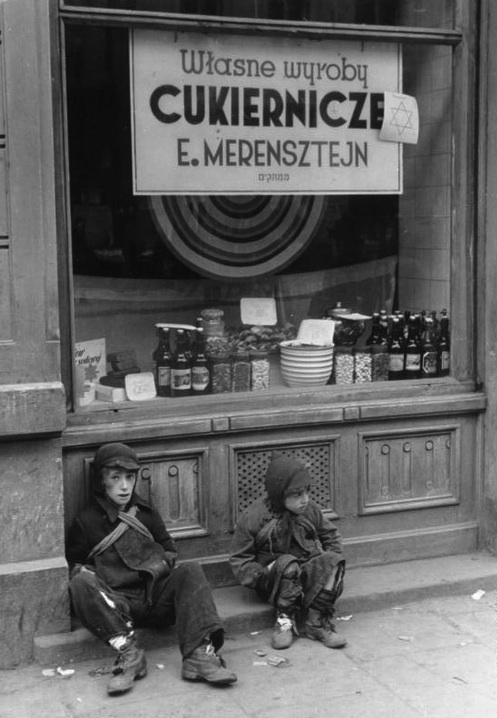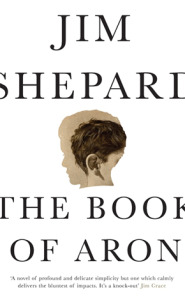The sickness
by Jim Shepard More kids got sick but Madame Stefa still slept downstairs with the healthy ones and Korczak upstairs in the isolation ward. “It’s cold for May,” he said to me one night when I came up to sit with him. He was writing something while everyone else slept.
More kids got sick but Madame Stefa still slept downstairs with the healthy ones and Korczak upstairs in the isolation ward. “It’s cold for May,” he said to me one night when I came up to sit with him. He was writing something while everyone else slept.
“What’s that smell?” I asked.
“The carbide in the lamp,” he said.
The vodka bottle was gone. “What’s that?” I asked.
“Raw alcohol I mix with water and a dissolved hard candy for sweetener,” he said. He asked why I hadn’t eaten dinner and when I told him I hadn’t wanted to, he said fatigue and apathy were symptoms of malnutrition. I asked why he hadn’t eaten dinner and he said eating was work and that he was tired.
I sat next to him on Jerzyk’s bed. Jerzyk was sweating and his eyes were open. “Alcohol mixed with warm water takes away the ache and sore eyes,” Korczak said.
While he wrote he kept his face close to the paper. “What are you writing?” I finally asked.
He said it was to the Judenrat, requesting he be allowed to take over the public shelter that housed a thousand children on Dzielna Street. He said on his application he was spreading rumors that he was a thief who would let children starve so he could qualify for the job. He’d said he was unbalanced and excitable and his health had passed the test in the Gestapo’s prison the year before: that despite the exacting conditions there, not once had he reported sick, not once had he requested a doctor, not once had he absented himself from work in the prison yard. He said he told them that he presently ate like a horse and slept soundly after ten shots of vodka and that experience had now endowed him with the ability to collaborate with criminals and born imbeciles.
“What does the job pay?” I asked him.
He said he’d requested a trial period and a minimum of twenty thousand złotys for the children’s upkeep.
“Do you think you’ll get it?” I asked.
“I already got it,” he said. “I was handed the job permanently and given one thousand złotys. Who’s going to deny the Old Doctor from the Radio the privilege of overseeing kids who are dying at the rate of ten a day?”
“So then what are you writing?” I asked him.
“I had imagined the criminal types among the personnel there would voluntarily leave since they obviously found the place so hateful,” he said. “And they were bound to it only by cowardice and inertia. But instead they closed ranks against me. I’m the stranger. The enemy. The one good nurse died of tuberculosis. I’m trying to get the rest sacked.”
“The salt of the earth dissolves and the shit remains,” I told him. It was something Lutek always said.
“That describes it,” Korczak said.
Jerzyk told us he was thirsty and Korczak pulled himself off his bed and went down to the kitchen and returned with a cup of water. “Here I have four ways of dealing with undesirable newcomers,” he said to me. “I bribe them; I agree to anything; I lie low and mark time, waiting for the moment to strike; or I wear them out. There, none of these will work.”
“Thank you,” Jerzyk said, and Korczak told him he was welcome.
“Today everyone will be restless because I’ve got a headache,” he said. “Or because it’s cold. Or because they want an outing.” Jerzyk drank his water.
“Oh, listen to me,” he finally said, and put his hand on Jerzyk’s head. “I remember an old teacher who got indignant with us because our hair grew too fast.”
…
The next day he was too weak to go on his rounds but the day after I heard him exclaiming, “I’m up! I’m up! I’m on my feet!” even from the floor below where I was sleeping.
“This one again?” Zygmuś said when he saw us getting ready to leave. “I think Pan Doctor has a new favorite.”
 We went to a butcher’s shop Korczak had heard would be open for the day. “Is this made from people?” he joked when the woman told him the price. “It’s too cheap for horsemeat.”
We went to a butcher’s shop Korczak had heard would be open for the day. “Is this made from people?” he joked when the woman told him the price. “It’s too cheap for horsemeat.”
“How would I know,” she said. “I wasn’t there when they made it.”
On Twarda the road was blocked by Lejkin and a line of yellow police. He called to us and left his spot in the front to come over to talk.
“I understand you’ve been given new responsibilities,” Korczak told him. Lejkin bowed, and Korczak turned to me. “Mr Szeryński was arrested for black marketing in furs.” I told him I didn’t care and he explained that it meant my friend was now in command of the Order Service. I said he wasn’t my friend and Lejkin said, speaking of that, one of the new imperatives was a daily quota for deportation and Service members who failed to fill their quotas would be departing themselves. And some of his men would prefer not to select their neighbours and maybe they could use the rest of my old gang since smugglers were always a good place to start.
“Leave the boy alone,” Korczak told him.
“I’m giving him fair warning,” Lejkin said. “‘About business we’ll be transacting in the future.” Korczak pulled me away.
“You needn’t hide behind him,” Lejkin called. “I can see you.”
But then he left us alone and Korczak told me after a few days that I could stop hiding. “Mr Lejkin has other things to worry about,” he said.
It got hot again on Shavuot, the Feast of First Fruits, and the fly problem got so bad that Korczak finally set up a toilet-fee scale: you had to kill five flies to piss and fifteen to shit. Whoever was next in line was the one who checked. Mietek asked me one morning if he could kill them later because he couldn’t hold it and I told him I’d do it for him.
She said maybe the Germans would stop and he told her the Germans were running the world’s largest enterprise and its name was war and they weren’t playing at it and it wasn’t clean or pleasant or sweet-smelling.”
Then at the beginning of June everyone had diarrhea and the chamber pots boiled over. Korczak and Madame Stefa figured it was something that had been in the bread. The Children’s Home was now a home for the aged, he told her one night, and the whole group was worn down and mutinous and resentful. You could hear kids moaning on the chamber pots and on the toilet.
She said maybe the Germans would stop and he told her the Germans were running the world’s largest enterprise and its name was war and they weren’t playing at it and it wasn’t clean or pleasant or sweet-smelling. He said that We are the Germans meant We are the steel roller. And then when she started to cry he said without sounding sorry that this was how he felt as well.
…
The night the yellow police came for me I was able to hide. There was shooting all night and Madame Stefa was weeping the next morning and wouldn’t stop until Korczak had two of the staff members take her upstairs. He gathered the kids around him and told them that Madame was distraught because one of her favorite boys had been killed. He named the boy and no one knew him and he explained that he’d already graduated. One kid asked what was happening and he said no one knew but that night I overheard him tell Madame Stefa the Germans were exterminating all of the smugglers. Soldiers with dogs broke down doors and dragged people out of houses. The Order Service now patrolled the ghetto wall. They’d painted white numbers every fifty metres, with every policeman responsible for his own numbered area. The plan was apparently to use those Jews to starve all the other ones to death.
Madame Stefa remembered when the boy who’d been killed had helped bring in half a cow in six valises over the roof of a building that had been emptied by typhus, and how much the beef had thrilled all the children. She remembered that after the city surrendered he broke into a warehouse of army stores and came away with two pillowcases filled with rice and sugar.
She asked Korczak if he wanted tea, and he told her that if she wanted to make tea she should make some for Jerzyk, whose fever was worse. She asked if he wanted saccharine water and he said that if she wanted to make some saccharine water she should make it for a staff member who’d given his portion at dinner to one of the weeping little girls.
The next morning I was assigned the coal chute in the cellar and while I was down there Zygmuś came down the stairs with a carbide lamp. The carbide hissed. He said first that I looked like a chimney sweep and second that a boy had come to the door with a message for me and said that I’d know who he was. The boy said to tell me that Adina had come out of hiding because the Germans had called to her and told her they would kill her friends if she didn’t. And that once she did, the Germans hung her in her apartment in front of her mother. And the boy wanted me to know he was going to find me and kill me. When he finished, Zygmuś made a face as if to say that was that, then kicked at some loose coal and took his lamp back up the stairs.
Extracted from The Book of Aron.
 Jim Shepard is a National Book Award finalist and the author of six novels and four collections of stories, including Nosferatu and Like You’d Understand, Anyway. He lives in Massachusetts with his family and teaches creative writing at Williams College. The Book of Aron is published by Quercus in hardback, large-format paperback and eBook. Read more.
Jim Shepard is a National Book Award finalist and the author of six novels and four collections of stories, including Nosferatu and Like You’d Understand, Anyway. He lives in Massachusetts with his family and teaches creative writing at Williams College. The Book of Aron is published by Quercus in hardback, large-format paperback and eBook. Read more.
jimshepard.wordpress.com
“Jim Shepard has written some of the best books I’ve read. The Book of Aron is his best.” Roddy Doyle

